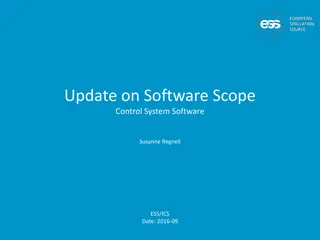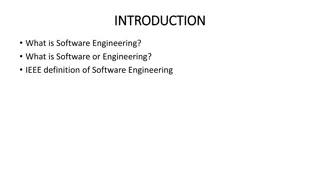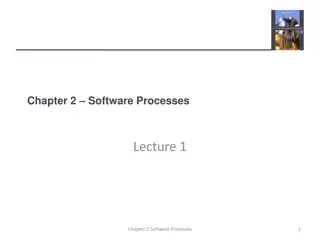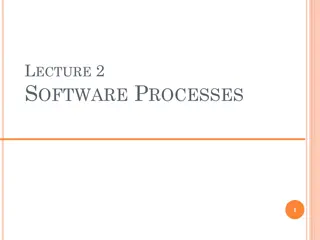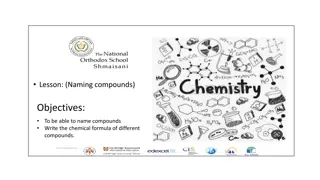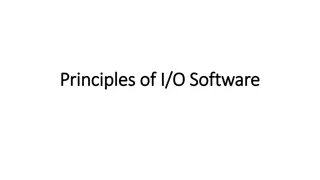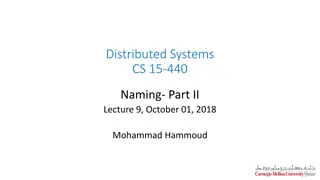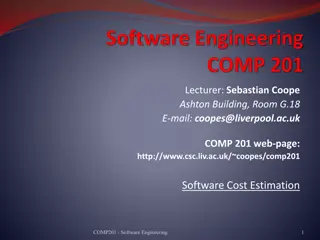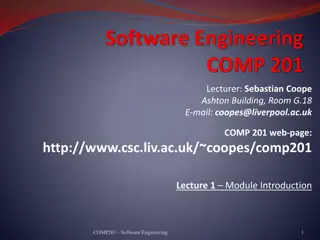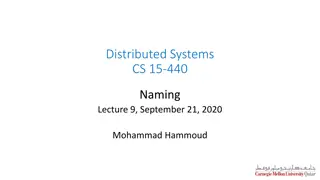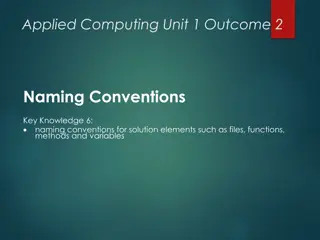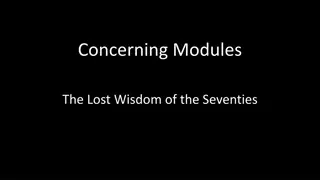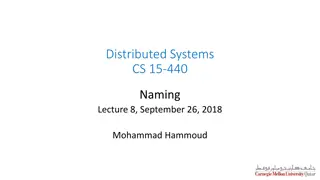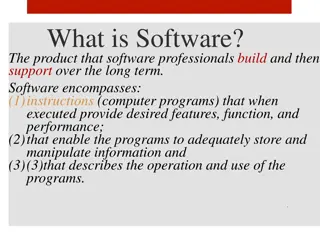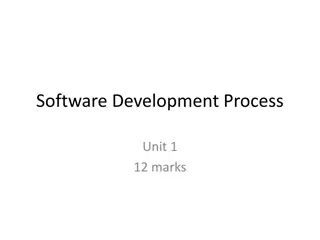The Importance of Naming in Software Development
Effective naming of variables, functions, and concepts is crucial in software development to enhance readability, maintainability, and communication among team members and stakeholders. This article stresses the significance of thoughtful naming conventions, providing insights into the impact of names on code comprehension and collaboration.
Download Presentation

Please find below an Image/Link to download the presentation.
The content on the website is provided AS IS for your information and personal use only. It may not be sold, licensed, or shared on other websites without obtaining consent from the author.If you encounter any issues during the download, it is possible that the publisher has removed the file from their server.
You are allowed to download the files provided on this website for personal or commercial use, subject to the condition that they are used lawfully. All files are the property of their respective owners.
The content on the website is provided AS IS for your information and personal use only. It may not be sold, licensed, or shared on other websites without obtaining consent from the author.
E N D
Presentation Transcript
Kate Gregory NAMING IS HARD: LET'S DO BETTER kate@gregcons.com www.gregcons.com/kateblog @gregcons
NAMING THINGS It matters This is how we explain ourselves To each other To our customers, users, managers, C++ people are famously bad at it It s a learned skill That means we can improve 3
NOT NAMING CONVENTIONS camelCase, snake_case, PascalCase, m_thing, thing_, ALLCAPS Bikeshed that stuff on your own time Pick a convention and stick to it Use tools for that kind of renaming 4
NAMES CARRY MEANING Inactive date, end date or expiry date? Can you use it on that date? Is it actually a date and time? What do the users call it? Does empty() empty a collection, or tell you whether or not it s empty? What does clear() do? 5
void setStatus(ApplicationStatus s) { status = s; lastUpdated = now(); if (status == ApplicationStatus::Approved) { // . . . } if (status == ApplicationStatus::Denied) void Deny() { status = ApplicationStatus::Denied; lastUpdated = now(); status = s; lastUpdated = now(); } void setStatus(ApplicationStatus s) { status = s; } void Approve() { status = ApplicationStatus::Approved; lastUpdated = now(); // . . . } NAMES TELL A STORY If you name things well, you need less comments Bad names confuse Really bad names mislead { // . . . } } // . . . } void setStatus(ApplicationStatus s) { 7
NAMING IS HARD Giving something the correct name may happen long after it s first written When refactoring, one technique is to give functions literally nonsense names Dfhtjd Or extremely verbose ones SetShippingCostsAdjustTotalAndMarkAsShipped Eventually you give things their true names 8
Naming requires empathy 9
AN <ALGORITHM> STORY sort partial_sort partial_sort_copy 1 5 4 2 9 7 1 4 2 9 7 5 1 2 4 9 5 7 1 2 4 top_n top_n_sorted 10
CONSISTENCY 12
USER NOMENCLATURE Names exist outside your code Headings on reports Emails Prompts Human conversations about the system Use the same words/names in all contexts Everyone should call things by their proper names, everywhere 13
USER NOMENCLATURE Don t use the same words for different things Be arbitrary: a certification expires but a coupon becomes invalid Then stick to it Don t accept similar English words in conversation; stay precise Expired/inactive/invalid Coupon/voucher/discount 14
DONT INVENT BUSINESS WORDS Naming pieces of a function is hard Avoid pre/post and other dependent names Unless the business uses them Prefer single English words like Save or Location to implementation-focused words like UpdateConfigFile or StorageCoOrdinates PreLoad(user, section); Load(begin, end, filter); PostLoad(user, category); 15
DONT MISMATCH NATURAL PAIRS Begin goes with end, not last (last goes with first) Create goes with destroy, not cleanup Open goes with close, not release Next goes with previous, not rewind Put goes with get, not retrieve Source goes with destination, not target 16
METAPHORS ARENT UNIVERSAL Not everyone has your background Many are very overloaded Red/Green White/Black Does filter() include or exclude? Try include_if() and exclude_if() Try using a more literal word 17
VERBS HELP FUNCTIONS MAKE SENSE Ideally a service of the system or object: Update, CalculateTax, DeductFees, MarkAsRead You may want to use helper verbs IsEmpty() is less ambiguous than Empty() [[nodiscard]] is a signal that people misunderstand the name you re using now 19
VERBS HELP FUNCTIONS MAKE SENSE HasX() and CanX() are also useful IsShippable() vs CanShip() vs getShipStatus() if (!ReadyToShip()) vs if (NotReadyToShip()) if (! isInvalid()) 20
ORDER MATTERS If you are going to have a noun and a verb in each function name, should they be VerbNoun or NounVerb? We never say TaxDetermine() or FeesCharge() but we do say EmployeeUpdate() and InventoryCheck() why? Make a deliberate choice, think about it 21
TOOLS MATTER If similar functions all start the same They are listed together in IDEs that show alphabetical lists of functions They may be sorted together by tidiers that do so You may have to type more of them before you can autocomplete Do HasEntries() and HasRisks() belong together? Away from GetRisks() and GetEntries(), and AddEntry() and AddRisk()? 22
PARAMETERS Serve two purposes They are local variables in the function scope, so you name them with that in mind Never shadow member variables, but please also don t argx They are cues to the function caller Never omit them in headers 23
CLASSES ARE NOUNS Anything ending in er (et al) is suspect without a noun Don t overdecorate Suffixes like proxy, factory, adapter, interface really needed? Monad? Singleton? AbstractFactory? Base? Impl? Prefixes such as project names are clutter We have namespaces Project names and code names change 26
CLASSES ARE NOUNS Don t list the contents NameAndAddress? NameAddressAndPhone? NameAddressPhoneAndEmail? ContactInfo Purpose of this class? AbsoluteOrientationEulerAnglesFusionAlgorithmUsingAcceler ometerAndMagnetometerTest 27
MEMBERS The class name is implicitly included; don t repeat it Employee::EmployeeName Employee::Name Employee::PrintEmployeeRecord() Employee::PrintRecord() 29
MEMBERS Adjectives are your friend FullName is better than Name AnnualSalary is better than Salary Avoid encoding type Possible exception for dates HireDate not Hired ShipDate not Shipped 30
TRADITIONAL MEMBER FUNCTION NAMES If you put real work in a constructor or a destructor, others will know when it happens Eg open/close a file We recognize get/set for better or worse Try to reserve get for {return thingy;} and use fetch/read/load/retrieve otherwise People expect getThingy() to be const 31
TRADITIONAL MEMBER FUNCTION NAMES void Temperature(int t) and int Temperature() const are also well known Some people really hate them; be careful 32
ENUMS Prefer scoped enums So you don t have to encode enum name into values eg NT_OK, SB_OK etc As with members, don t repeat the enum name Think about whether or not to leak the enum values outside of the class they help { // . . . } if (nextApplication.getStatus() == ApplicationStatus::Approved) { // . . . } if (nextApplication.isApproved()) 33
SOME HEURISTICS FOR LOCAL VARIABLES 34
RARELY, SHORTER IS BETTER i, j, k in loops If loop is right; consider a ranged for or an algorithm x, y, t, v etc in scientific calculations Use the same notation as the formula When it has a tiny scope almost like a pronoun responses.take(r); } string r = getNextResponse(); while (!r.empty()) { 35
MOST OF THE TIME, LONGER IS BETTER Nouns Add Adjectives liberally Next, current, remaining, active, . . . Avoid Encoding Only Type And other forms of overdecorating Employee e; vector<Policy> policies; double d; 36
MOST OF THE TIME, LONGER IS BETTER Focus on the purpose of the variable, not what it holds Why are you building a collection of Policies? What is that collection for? Consider the greppers 37
ABBR Abbreviations are generally bad Special dispensation to id First syllable only may be obvious to you, not others First letters is generally write-only ar ti rd Vowels are free 38
ALL OF THE ABOVE If you write a templated function, it s a function, so use those approaches If you write a templated class, it s a class, so use those approaches 40
ALL OF THE ABOVE Then there s the matter of the typenames template<class T> or template<typename T>? Compiler doesn t care Some humans say typename if int etc are ok, class if they are not Very weak signal 41
TYPENAME NAMES template <class _Elem, class _Traits = char_traits<_Elem>, class _Alloc = allocator<_Elem>> class basic_string { // null-terminated Only one? T Two? Please be meaningful transparent array of elements // . . . template <class _Ty, class _Alloc = allocator<_Ty>> class vector { // varying size array of values 42
WHEN YOU KNOW WHAT IT IS Sometimes before you even write the code Sometimes after you ve been reading or debugging for some time Never miss an opportunity to fix a name Have good tools for this Sometimes when code changes, names need to change too 45
TEMPORARY NAMES Especially in refactoring But also in greenfield work How will you remember to give it a true name later? Never choose something rude or embarrassing 46
NAMES AS MOTIVATION AND REVIEW Process() can be 5000 lines long and nobody understands it When you insist on a better name, this will change Probably will start with giving names to parts of it Eventually the whole team will get what it does, and it becomes name-able 47
NAMES AS MOTIVATION AND REVIEW Things are hard or impossible to name when they are the wrong size Demanding good names makes things the right size Good names make the code tell a story Demanding a story will get you good names 48
BETTER NAMING Care about the code you write, and the people who will read it Think about the purposes functions, classes etc serve and how they are used Don t be paralyzed by being unable to name something at first Fix it later! 49
BETTER NAMING Demand good names from yourself and those around you When you learn what something is, fix its name When you change what something is, change its name Use consistency and story telling to guide your choices 50


